-
AuthorSearch Results
-
February 6, 2024 at 11:02 pm #7355
In reply to: Smoke Signals: Arcanas of the Quadrivium’s incense
Interpretations
Truella
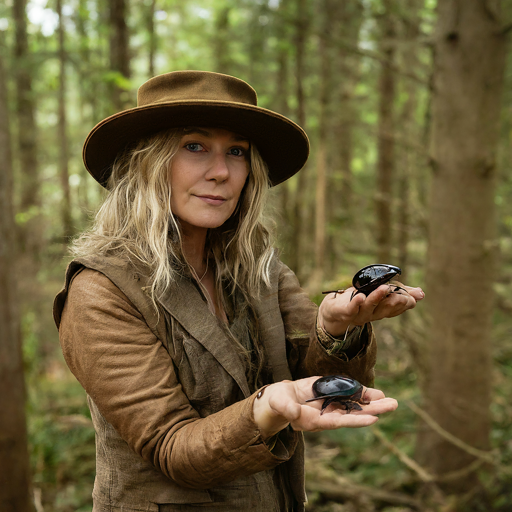
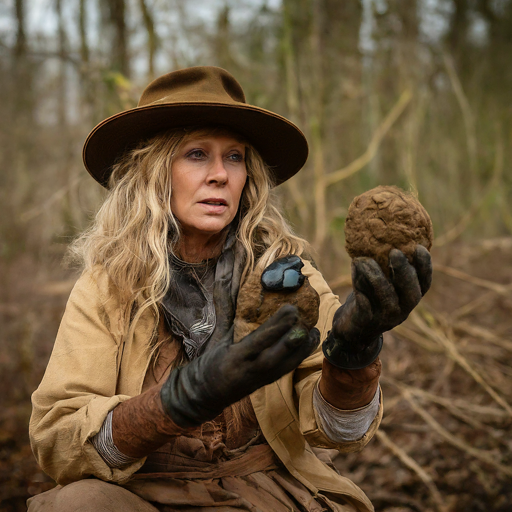

Frigella

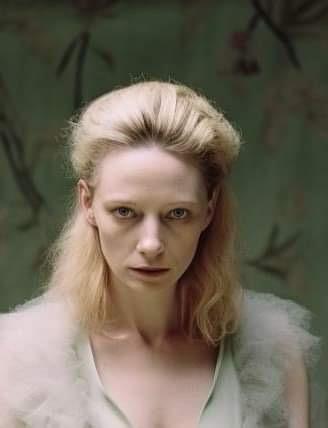

Eris

Jeezel (Jeeze the hair!)


Malové



Other characters
Fringella (and not Frigella, who’s blonde like Tilda)
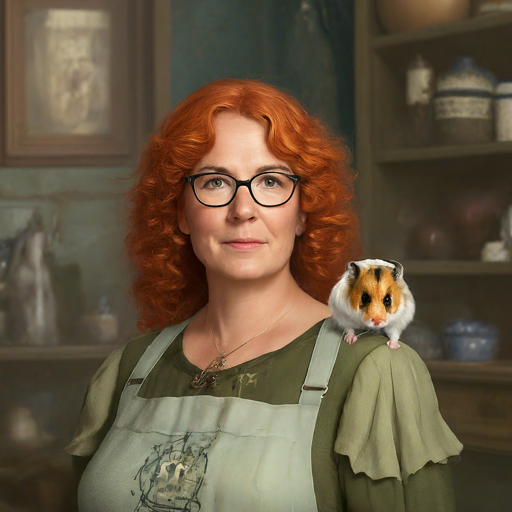
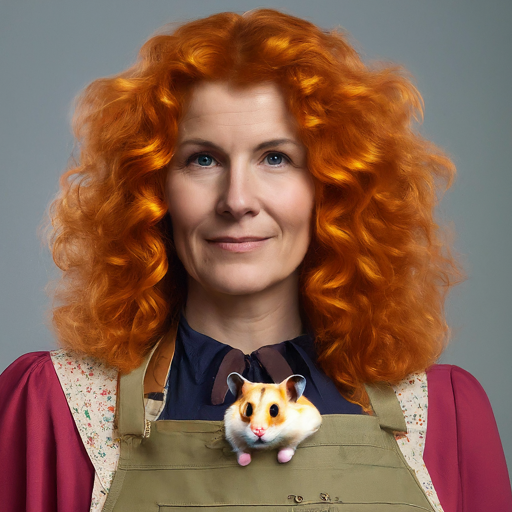
Specializing in elemental and herbal magic, Fringella has an intimate connection with the natural world. She is an adept healer and potion-maker, often creating remedies that blend traditional herbalism with powerful enchantments. Her signature spells often involve fire and earth, reflecting her passionate and grounded nature.
While she shares a name with Frigella, the two are quite different in both temperament and approach. Their interactions are marked by a mutual respect, though Fringella’s fiery disposition often contrasts sharply with Frigella’s more traditionalist and meticulous nature.
Eris’ aunt: Amara (
 )
)Amara, a woman of gentle yet resolute nature, provided Eris with a grounded upbringing amidst a world filled with arcane mysteries. Despite lacking magical abilities, Amara’s wisdom and nurturing spirit played a crucial role in shaping Eris’s character and guiding her through the complexities of her witch heritage. Amara’s home was a sanctuary where the mundane and the mystical coexisted harmoniously, offering Eris a unique perspective on the balance between everyday life and the magical realm.
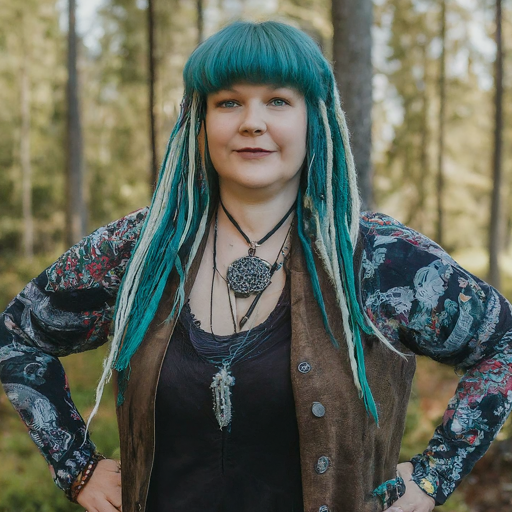
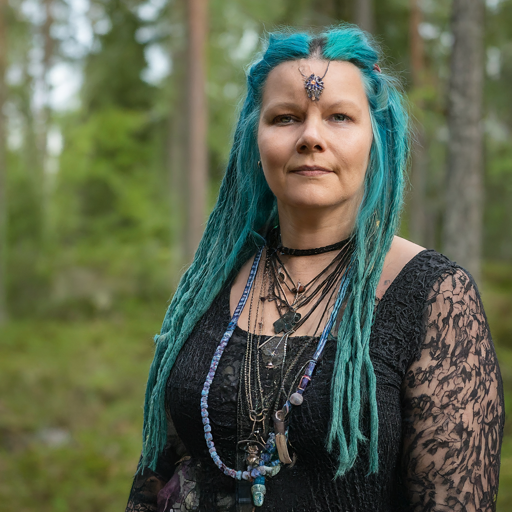 February 2, 2022 at 1:15 pm #6268
February 2, 2022 at 1:15 pm #6268In reply to: The Elusive Samuel Housley and Other Family Stories
From Tanganyika with Love
continued part 9
With thanks to Mike Rushby.
Lyamungu 3rd January 1945
Dearest Family.
We had a novel Christmas this year. We decided to avoid the expense of
entertaining and being entertained at Lyamungu, and went off to spend Christmas
camping in a forest on the Western slopes of Kilimanjaro. George decided to combine
business with pleasure and in this way we were able to use Government transport.
We set out the day before Christmas day and drove along the road which skirts
the slopes of Kilimanjaro and first visited a beautiful farm where Philip Teare, the ex
Game Warden, and his wife Mary are staying. We had afternoon tea with them and then
drove on in to the natural forest above the estate and pitched our tent beside a small
clear mountain stream. We decorated the tent with paper streamers and a few small
balloons and John found a small tree of the traditional shape which we decorated where
it stood with tinsel and small ornaments.We put our beer, cool drinks for the children and bottles of fresh milk from Simba
Estate, in the stream and on Christmas morning they were as cold as if they had been in
the refrigerator all night. There were not many presents for the children, there never are,
but they do not seem to mind and are well satisfied with a couple of balloons apiece,
sweets, tin whistles and a book each.George entertain the children before breakfast. He can make a magical thing out
of the most ordinary balloon. The children watched entranced as he drew on his pipe
and then blew the smoke into the balloon. He then pinched the neck of the balloon
between thumb and forefinger and released the smoke in little puffs. Occasionally the
balloon ejected a perfect smoke ring and the forest rang with shouts of “Do it again
Daddy.” Another trick was to blow up the balloon to maximum size and then twist the
neck tightly before releasing. Before subsiding the balloon darted about in a crazy
fashion causing great hilarity. Such fun, at the cost of a few pence.After breakfast George went off to fish for trout. John and Jim decided that they
also wished to fish so we made rods out of sticks and string and bent pins and they
fished happily, but of course quite unsuccessfully, for hours. Both of course fell into the
stream and got soaked, but I was prepared for this, and the little stream was so shallow
that they could not come to any harm. Henry played happily in the sand and I had a
most peaceful morning.Hamisi roasted a chicken in a pot over the camp fire and the jelly set beautifully in the
stream. So we had grilled trout and chicken for our Christmas dinner. I had of course
taken an iced cake for the occasion and, all in all, it was a very successful Christmas day.
On Boxing day we drove down to the plains where George was to investigate a
report of game poaching near the Ngassari Furrow. This is a very long ditch which has
been dug by the Government for watering the Masai stock in the area. It is also used by
game and we saw herds of zebra and wildebeest, and some Grant’s Gazelle and
giraffe, all comparatively tame. At one point a small herd of zebra raced beside the lorry
apparently enjoying the fun of a gallop. They were all sleek and fat and looked wild and
beautiful in action.We camped a considerable distance from the water but this precaution did not
save us from the mosquitoes which launched a vicious attack on us after sunset, so that
we took to our beds unusually early. They were on the job again when we got up at
sunrise so I was very glad when we were once more on our way home.“I like Christmas safari. Much nicer that silly old party,” said John. I agree but I think
it is time that our children learned to play happily with others. There are no other young
children at Lyamungu though there are two older boys and a girl who go to boarding
school in Nairobi.On New Years Day two Army Officers from the military camp at Moshi, came for
tea and to talk game hunting with George. I think they rather enjoy visiting a home and
seeing children and pets around.Eleanor.
Lyamungu 14 May 1945
Dearest Family.
So the war in Europe is over at last. It is such marvellous news that I can hardly
believe it. To think that as soon as George can get leave we will go to England and
bring Ann and George home with us to Tanganyika. When we know when this leave can
be arranged we will want Kate to join us here as of course she must go with us to
England to meet George’s family. She has become so much a part of your lives that I
know it will be a wrench for you to give her up but I know that you will all be happy to
think that soon our family will be reunited.The V.E. celebrations passed off quietly here. We all went to Moshi to see the
Victory Parade of the King’s African Rifles and in the evening we went to a celebration
dinner at the Game Warden’s house. Besides ourselves the Moores had invited the
Commanding Officer from Moshi and a junior officer. We had a very good dinner and
many toasts including one to Mrs Moore’s brother, Oliver Milton who is fighting in Burma
and has recently been awarded the Military Cross.There was also a celebration party for the children in the grounds of the Moshi
Club. Such a spread! I think John and Jim sampled everything. We mothers were
having our tea separately and a friend laughingly told me to turn around and have a look.
I did, and saw the long tea tables now deserted by all the children but my two sons who
were still eating steadily, and finding the party more exciting than the game of Musical
Bumps into which all the other children had entered with enthusiasm.There was also an extremely good puppet show put on by the Italian prisoners
of war from the camp at Moshi. They had made all the puppets which included well
loved characters like Snow White and the Seven Dwarfs and the Babes in the Wood as
well as more sophisticated ones like an irritable pianist and a would be prima donna. The
most popular puppets with the children were a native askari and his family – a very
happy little scene. I have never before seen a puppet show and was as entranced as
the children. It is amazing what clever manipulation and lighting can do. I believe that the
Italians mean to take their puppets to Nairobi and am glad to think that there, they will
have larger audiences to appreciate their art.George has just come in, and I paused in my writing to ask him for the hundredth
time when he thinks we will get leave. He says I must be patient because it may be a
year before our turn comes. Shipping will be disorganised for months to come and we
cannot expect priority simply because we have been separated so long from our
children. The same situation applies to scores of other Government Officials.
I have decided to write the story of my childhood in South Africa and about our
life together in Tanganyika up to the time Ann and George left the country. I know you
will have told Kate these stories, but Ann and George were so very little when they left
home that I fear that they cannot remember much.My Mother-in-law will have told them about their father but she can tell them little
about me. I shall send them one chapter of my story each month in the hope that they
may be interested and not feel that I am a stranger when at last we meet again.Eleanor.
Lyamungu 19th September 1945
Dearest Family.
In a months time we will be saying good-bye to Lyamungu. George is to be
transferred to Mbeya and I am delighted, not only as I look upon Mbeya as home, but
because there is now a primary school there which John can attend. I feel he will make
much better progress in his lessons when he realises that all children of his age attend
school. At present he is putting up a strong resistance to learning to read and spell, but
he writes very neatly, does his sums accurately and shows a real talent for drawing. If
only he had the will to learn I feel he would do very well.Jim now just four, is too young for lessons but too intelligent to be interested in
the ayah’s attempts at entertainment. Yes I’ve had to engage a native girl to look after
Henry from 9 am to 12.30 when I supervise John’s Correspondence Course. She is
clean and amiable, but like most African women she has no initiative at all when it comes
to entertaining children. Most African men and youths are good at this.I don’t regret our stay at Lyamungu. It is a beautiful spot and the change to the
cooler climate after the heat of Morogoro has been good for all the children. John is still
tall for his age but not so thin as he was and much less pale. He is a handsome little lad
with his large brown eyes in striking contrast to his fair hair. He is wary of strangers but
very observant and quite uncanny in the way he sums up people. He seldom gets up
to mischief but I have a feeling he eggs Jim on. Not that Jim needs egging.Jim has an absolute flair for mischief but it is all done in such an artless manner that
it is not easy to punish him. He is a very sturdy child with a cap of almost black silky hair,
eyes brown, like mine, and a large mouth which is quick to smile and show most beautiful
white and even teeth. He is most popular with all the native servants and the Game
Scouts. The servants call Jim, ‘Bwana Tembo’ (Mr Elephant) because of his sturdy
build.Henry, now nearly two years old, is quite different from the other two in
appearance. He is fair complexioned and fair haired like Ann and Kate, with large, black
lashed, light grey eyes. He is a good child, not so merry as Jim was at his age, nor as
shy as John was. He seldom cries, does not care to be cuddled and is independent and
strong willed. The servants call Henry, ‘Bwana Ndizi’ (Mr Banana) because he has an
inexhaustible appetite for this fruit. Fortunately they are very inexpensive here. We buy
an entire bunch which hangs from a beam on the back verandah, and pluck off the
bananas as they ripen. This way there is no waste and the fruit never gets bruised as it
does in greengrocers shops in South Africa. Our three boys make a delightful and
interesting trio and I do wish you could see them for yourselves.We are delighted with the really beautiful photograph of Kate. She is an
extraordinarily pretty child and looks so happy and healthy and a great credit to you.
Now that we will be living in Mbeya with a school on the doorstep I hope that we will
soon be able to arrange for her return home.Eleanor.
c/o Game Dept. Mbeya. 30th October 1945
Dearest Family.
How nice to be able to write c/o Game Dept. Mbeya at the head of my letters.
We arrived here safely after a rather tiresome journey and are installed in a tiny house on
the edge of the township.We left Lyamungu early on the morning of the 22nd. Most of our goods had
been packed on the big Ford lorry the previous evening, but there were the usual
delays and farewells. Of our servants, only the cook, Hamisi, accompanied us to
Mbeya. Japhet, Tovelo and the ayah had to be paid off and largesse handed out.
Tovelo’s granny had come, bringing a gift of bananas, and she also brought her little
granddaughter to present a bunch of flowers. The child’s little scolded behind is now
completely healed. Gifts had to be found for them too.At last we were all aboard and what a squash it was! Our few pieces of furniture
and packing cases and trunks, the cook, his wife, the driver and the turney boy, who
were to take the truck back to Lyamungu, and all their bits and pieces, bunches of
bananas and Fanny the dog were all crammed into the body of the lorry. George, the
children and I were jammed together in the cab. Before we left George looked
dubiously at the tyres which were very worn and said gloomily that he thought it most
unlikely that we would make our destination, Dodoma.Too true! Shortly after midday, near Kwakachinja, we blew a back tyre and there
was a tedious delay in the heat whilst the wheel was changed. We were now without a
spare tyre and George said that he would not risk taking the Ford further than Babati,
which is less than half way to Dodoma. He drove very slowly and cautiously to Babati
where he arranged with Sher Mohammed, an Indian trader, for a lorry to take us to
Dodoma the next morning.It had been our intention to spend the night at the furnished Government
Resthouse at Babati but when we got there we found that it was already occupied by
several District Officers who had assembled for a conference. So, feeling rather
disgruntled, we all piled back into the lorry and drove on to a place called Bereku where
we spent an uncomfortable night in a tumbledown hut.Before dawn next morning Sher Mohammed’s lorry drove up, and there was a
scramble to dress by the light of a storm lamp. The lorry was a very dilapidated one and
there was already a native woman passenger in the cab. I felt so tired after an almost
sleepless night that I decided to sit between the driver and this woman with the sleeping
Henry on my knee. It was as well I did, because I soon found myself dosing off and
drooping over towards the woman. Had she not been there I might easily have fallen
out as the battered cab had no door. However I was alert enough when daylight came
and changed places with the woman to our mutual relief. She was now able to converse
with the African driver and I was able to enjoy the scenery and the fresh air!
George, John and Jim were less comfortable. They sat in the lorry behind the
cab hemmed in by packing cases. As the lorry was an open one the sun beat down
unmercifully upon them until George, ever resourceful, moved a table to the front of the
truck. The two boys crouched under this and so got shelter from the sun but they still had
to endure the dust. Fanny complicated things by getting car sick and with one thing and
another we were all jolly glad to get to Dodoma.We spent the night at the Dodoma Hotel and after hot baths, a good meal and a
good nights rest we cheerfully boarded a bus of the Tanganyika Bus Service next
morning to continue our journey to Mbeya. The rest of the journey was uneventful. We slept two nights on the road, the first at Iringa Hotel and the second at Chimala. We
reached Mbeya on the 27th.I was rather taken aback when I first saw the little house which has been allocated
to us. I had become accustomed to the spacious houses we had in Morogoro and
Lyamungu. However though the house is tiny it is secluded and has a long garden
sloping down to the road in front and another long strip sloping up behind. The front
garden is shaded by several large cypress and eucalyptus trees but the garden behind
the house has no shade and consists mainly of humpy beds planted with hundreds of
carnations sadly in need of debudding. I believe that the previous Game Ranger’s wife
cultivated the carnations and, by selling them, raised money for War Funds.
Like our own first home, this little house is built of sun dried brick. Its original
owners were Germans. It is now rented to the Government by the Custodian of Enemy
Property, and George has his office in another ex German house.This afternoon we drove to the school to arrange about enrolling John there. The
school is about four miles out of town. It was built by the German settlers in the late
1930’s and they were justifiably proud of it. It consists of a great assembly hall and
classrooms in one block and there are several attractive single storied dormitories. This
school was taken over by the Government when the Germans were interned on the
outbreak of war and many improvements have been made to the original buildings. The
school certainly looks very attractive now with its grassed playing fields and its lawns and
bright flower beds.The Union Jack flies from a tall flagpole in front of the Hall and all traces of the
schools German origin have been firmly erased. We met the Headmaster, Mr
Wallington, and his wife and some members of the staff. The school is co-educational
and caters for children from the age of seven to standard six. The leaving age is elastic
owing to the fact that many Tanganyika children started school very late because of lack
of educational facilities in this country.The married members of the staff have their own cottages in the grounds. The
Matrons have quarters attached to the dormitories for which they are responsible. I felt
most enthusiastic about the school until I discovered that the Headmaster is adamant
upon one subject. He utterly refuses to take any day pupils at the school. So now our
poor reserved Johnny will have to adjust himself to boarding school life.
We have arranged that he will start school on November 5th and I shall be very
busy trying to assemble his school uniform at short notice. The clothing list is sensible.
Boys wear khaki shirts and shorts on weekdays with knitted scarlet jerseys when the
weather is cold. On Sundays they wear grey flannel shorts and blazers with the silver
and scarlet school tie.Mbeya looks dusty, brown and dry after the lush evergreen vegetation of
Lyamungu, but I prefer this drier climate and there are still mountains to please the eye.
In fact the lower slopes of Lolesa Mountain rise at the upper end of our garden.Eleanor.
c/o Game Dept. Mbeya. 21st November 1945
Dearest Family.
We’re quite settled in now and I have got the little house fixed up to my
satisfaction. I have engaged a rather uncouth looking houseboy but he is strong and
capable and now that I am not tied down in the mornings by John’s lessons I am able to
go out occasionally in the mornings and take Jim and Henry to play with other children.
They do not show any great enthusiasm but are not shy by nature as John is.
I have had a good deal of heartache over putting John to boarding school. It
would have been different had he been used to the company of children outside his
own family, or if he had even known one child there. However he seems to be adjusting
himself to the life, though slowly. At least he looks well and tidy and I am quite sure that
he is well looked after.I must confess that when the time came for John to go to school I simply did not
have the courage to take him and he went alone with George, looking so smart in his
new uniform – but his little face so bleak. The next day, Sunday, was visiting day but the
Headmaster suggested that we should give John time to settle down and not visit him
until Wednesday.When we drove up to the school I spied John on the far side of the field walking
all alone. Instead of running up with glad greetings, as I had expected, he came almost
reluctently and had little to say. I asked him to show me his dormitory and classroom and
he did so politely as though I were a stranger. At last he volunteered some information.
“Mummy,” he said in an awed voice, Do you know on the night I came here they burnt a
man! They had a big fire and they burnt him.” After a blank moment the penny dropped.
Of course John had started school and November the fifth but it had never entered my
head to tell him about that infamous character, Guy Fawkes!I asked John’s Matron how he had settled down. “Well”, she said thoughtfully,
“John is very good and has not cried as many of the juniors do when they first come
here, but he seems to keep to himself all the time.” I went home very discouraged but
on the Sunday John came running up with another lad of about his own age.” This is my
friend Marks,” he announced proudly. I could have hugged Marks.Mbeya is very different from the small settlement we knew in the early 1930’s.
Gone are all the colourful characters from the Lupa diggings for the alluvial claims are all
worked out now, gone also are our old friends the Menzies from the Pub and also most
of the Government Officials we used to know. Mbeya has lost its character of a frontier
township and has become almost suburban.The social life revolves around two places, the Club and the school. The Club
which started out as a little two roomed building, has been expanded and the golf
course improved. There are also tennis courts and a good library considering the size of
the community. There are frequent parties and dances, though most of the club revenue
comes from Bar profits. The parties are relatively sober affairs compared with the parties
of the 1930’s.The school provides entertainment of another kind. Both Mr and Mrs Wallington
are good amateur actors and I am told that they run an Amateur Dramatic Society. Every
Wednesday afternoon there is a hockey match at the school. Mbeya town versus a
mixed team of staff and scholars. The match attracts almost the whole European
population of Mbeya. Some go to play hockey, others to watch, and others to snatch
the opportunity to visit their children. I shall have to try to arrange a lift to school when
George is away on safari.I have now met most of the local women and gladly renewed an old friendship
with Sheilagh Waring whom I knew two years ago at Morogoro. Sheilagh and I have
much in common, the same disregard for the trappings of civilisation, the same sense of
the ludicrous, and children. She has eight to our six and she has also been cut off by the
war from two of her children. Sheilagh looks too young and pretty to be the mother of so
large a family and is, in fact, several years younger than I am. her husband, Donald, is a
large quiet man who, as far as I can judge takes life seriously.Our next door neighbours are the Bank Manager and his wife, a very pleasant
couple though we seldom meet. I have however had correspondence with the Bank
Manager. Early on Saturday afternoon their houseboy brought a note. It informed me
that my son was disturbing his rest by precipitating a heart attack. Was I aware that my
son was about 30 feet up in a tree and balanced on a twig? I ran out and,sure enough,
there was Jim, right at the top of the tallest eucalyptus tree. It would be the one with the
mound of stones at the bottom! You should have heard me fluting in my most
wheedling voice. “Sweets, Jimmy, come down slowly dear, I’ve some nice sweets for
you.”I’ll bet that little story makes you smile. I remember how often you have told me
how, as a child, I used to make your hearts turn over because I had no fear of heights
and how I used to say, “But that is silly, I won’t fall.” I know now only too well, how you
must have felt.Eleanor.
c/o Game Dept. Mbeya. 14th January 1946
Dearest Family.
I hope that by now you have my telegram to say that Kate got home safely
yesterday. It was wonderful to have her back and what a beautiful child she is! Kate
seems to have enjoyed the train journey with Miss Craig, in spite of the tears she tells
me she shed when she said good-bye to you. She also seems to have felt quite at
home with the Hopleys at Salisbury. She flew from Salisbury in a small Dove aircraft
and they had a smooth passage though Kate was a little airsick.I was so excited about her home coming! This house is so tiny that I had to turn
out the little store room to make a bedroom for her. With a fresh coat of whitewash and
pretty sprigged curtains and matching bedspread, borrowed from Sheilagh Waring, the
tiny room looks most attractive. I had also iced a cake, made ice-cream and jelly and
bought crackers for the table so that Kate’s home coming tea could be a proper little
celebration.I was pleased with my preparations and then, a few hours before the plane was
due, my crowned front tooth dropped out, peg and all! When my houseboy wants to
describe something very tatty, he calls it “Second-hand Kabisa.” Kabisa meaning
absolutely. That is an apt description of how I looked and felt. I decided to try some
emergency dentistry. I think you know our nearest dentist is at Dar es Salaam five
hundred miles away.First I carefully dried the tooth and with a match stick covered the peg and base
with Durofix. I then took the infants rubber bulb enema, sucked up some heat from a
candle flame and pumped it into the cavity before filling that with Durofix. Then hopefully
I stuck the tooth in its former position and held it in place for several minutes. No good. I
sent the houseboy to a shop for Scotine and tried the whole process again. No good
either.When George came home for lunch I appealed to him for advice. He jokingly
suggested that a maize seed jammed into the space would probably work, but when
he saw that I really was upset he produced some chewing gum and suggested that I
should try that . I did and that worked long enough for my first smile anyway.
George and the three boys went to meet Kate but I remained at home to
welcome her there. I was afraid that after all this time away Kate might be reluctant to
rejoin the family but she threw her arms around me and said “Oh Mummy,” We both
shed a few tears and then we both felt fine.How gay Kate is, and what an infectious laugh she has! The boys follow her
around in admiration. John in fact asked me, “Is Kate a Princess?” When I said
“Goodness no, Johnny, she’s your sister,” he explained himself by saying, “Well, she
has such golden hair.” Kate was less complementary. When I tucked her in bed last night
she said, “Mummy, I didn’t expect my little brothers to be so yellow!” All three boys
have been taking a course of Atebrin, an anti-malarial drug which tinges skin and eyeballs
yellow.So now our tiny house is bursting at its seams and how good it feels to have one
more child under our roof. We are booked to sail for England in May and when we return
we will have Ann and George home too. Then I shall feel really content.Eleanor.
c/o Game Dept. Mbeya. 2nd March 1946
Dearest Family.
My life just now is uneventful but very busy. I am sewing hard and knitting fast to
try to get together some warm clothes for our leave in England. This is not a simple
matter because woollen materials are in short supply and very expensive, and now that
we have boarding school fees to pay for both Kate and John we have to budget very
carefully indeed.Kate seems happy at school. She makes friends easily and seems to enjoy
communal life. John also seems reconciled to school now that Kate is there. He no
longer feels that he is the only exile in the family. He seems to rub along with the other
boys of his age and has a couple of close friends. Although Mbeya School is coeducational
the smaller boys and girls keep strictly apart. It is considered extremely
cissy to play with girls.The local children are allowed to go home on Sundays after church and may bring
friends home with them for the day. Both John and Kate do this and Sunday is a very
busy day for me. The children come home in their Sunday best but bring play clothes to
change into. There is always a scramble to get them to bath and change again in time to
deliver them to the school by 6 o’clock.When George is home we go out to the school for the morning service. This is
taken by the Headmaster Mr Wallington, and is very enjoyable. There is an excellent
school choir to lead the singing. The service is the Church of England one, but is
attended by children of all denominations, except the Roman Catholics. I don’t think that
more than half the children are British. A large proportion are Greeks, some as old as
sixteen, and about the same number are Afrikaners. There are Poles and non-Nazi
Germans, Swiss and a few American children.All instruction is through the medium of English and it is amazing how soon all the
foreign children learn to chatter in English. George has been told that we will return to
Mbeya after our leave and for that I am very thankful as it means that we will still be living
near at hand when Jim and Henry start school. Because many of these children have to
travel many hundreds of miles to come to school, – Mbeya is a two day journey from the
railhead, – the school year is divided into two instead of the usual three terms. This
means that many of these children do not see their parents for months at a time. I think
this is a very sad state of affairs especially for the seven and eight year olds but the
Matrons assure me , that many children who live on isolated farms and stations are quite
reluctant to go home because they miss the companionship and the games and
entertainment that the school offers.My only complaint about the life here is that I see far too little of George. He is
kept extremely busy on this range and is hardly at home except for a few days at the
months end when he has to be at his office to check up on the pay vouchers and the
issue of ammunition to the Scouts. George’s Range takes in the whole of the Southern
Province and the Southern half of the Western Province and extends to the border with
Northern Rhodesia and right across to Lake Tanganyika. This vast area is patrolled by
only 40 Game Scouts because the Department is at present badly under staffed, due
partly to the still acute shortage of rifles, but even more so to the extraordinary reluctance
which the Government shows to allocate adequate funds for the efficient running of the
Department.The Game Scouts must see that the Game Laws are enforced, protect native
crops from raiding elephant, hippo and other game animals. Report disease amongst game and deal with stock raiding lions. By constantly going on safari and checking on
their work, George makes sure the range is run to his satisfaction. Most of the Game
Scouts are fine fellows but, considering they receive only meagre pay for dangerous
and exacting work, it is not surprising that occasionally a Scout is tempted into accepting
a bribe not to report a serious infringement of the Game Laws and there is, of course,
always the temptation to sell ivory illicitly to unscrupulous Indian and Arab traders.
Apart from supervising the running of the Range, George has two major jobs.
One is to supervise the running of the Game Free Area along the Rhodesia –
Tanganyika border, and the other to hunt down the man-eating lions which for years have
terrorised the Njombe District killing hundreds of Africans. Yes I know ‘hundreds’ sounds
fantastic, but this is perfectly true and one day, when the job is done and the official
report published I shall send it to you to prove it!I hate to think of the Game Free Area and so does George. All the game from
buffalo to tiny duiker has been shot out in a wide belt extending nearly two hundred
miles along the Northern Rhodesia -Tanganyika border. There are three Europeans in
widely spaced camps who supervise this slaughter by African Game Guards. This
horrible measure is considered necessary by the Veterinary Departments of
Tanganyika, Rhodesia and South Africa, to prevent the cattle disease of Rinderpest
from spreading South.When George is home however, we do relax and have fun. On the Saturday
before the school term started we took Kate and the boys up to the top fishing camp in
the Mporoto Mountains for her first attempt at trout fishing. There are three of these
camps built by the Mbeya Trout Association on the rivers which were first stocked with
the trout hatched on our farm at Mchewe. Of the three, the top camp is our favourite. The
scenery there is most glorious and reminds me strongly of the rivers of the Western
Cape which I so loved in my childhood.The river, the Kawira, flows from the Rungwe Mountain through a narrow valley
with hills rising steeply on either side. The water runs swiftly over smooth stones and
sometimes only a foot or two below the level of the banks. It is sparkling and shallow,
but in places the water is deep and dark and the banks high. I had a busy day keeping
an eye on the boys, especially Jim, who twice climbed out on branches which overhung
deep water. “Mummy, I was only looking for trout!”How those kids enjoyed the freedom of the camp after the comparative
restrictions of town. So did Fanny, she raced about on the hills like a mad dog chasing
imaginary rabbits and having the time of her life. To escape the noise and commotion
George had gone far upstream to fish and returned in the late afternoon with three good
sized trout and four smaller ones. Kate proudly showed George the two she had caught
with the assistance or our cook Hamisi. I fear they were caught in a rather unorthodox
manner but this I kept a secret from George who is a stickler for the orthodox in trout
fishing.Eleanor.
Jacksdale England 24th June 1946
Dearest Family.
Here we are all together at last in England. You cannot imagine how wonderful it
feels to have the whole Rushby family reunited. I find myself counting heads. Ann,
George, Kate, John, Jim, and Henry. All present and well. We had a very pleasant trip
on the old British India Ship Mantola. She was crowded with East Africans going home
for the first time since the war, many like us, eagerly looking forward to a reunion with their
children whom they had not seen for years. There was a great air of anticipation and
good humour but a little anxiety too.“I do hope our children will be glad to see us,” said one, and went on to tell me
about a Doctor from Dar es Salaam who, after years of separation from his son had
recently gone to visit him at his school. The Doctor had alighted at the railway station
where he had arranged to meet his son. A tall youth approached him and said, very
politely, “Excuse me sir. Are you my Father?” Others told me of children who had
become so attached to their relatives in England that they gave their parents a very cool
reception. I began to feel apprehensive about Ann and George but fortunately had no
time to mope.Oh, that washing and ironing for six! I shall remember for ever that steamy little
laundry in the heat of the Red Sea and queuing up for the ironing and the feeling of guilt
at the size of my bundle. We met many old friends amongst the passengers, and made
some new ones, so the voyage was a pleasant one, We did however have our
anxious moments.John was the first to disappear and we had an anxious search for him. He was
quite surprised that we had been concerned. “I was just talking to my friend Chinky
Chinaman in his workshop.” Could John have called him that? Then, when I returned to
the cabin from dinner one night I found Henry swigging Owbridge’s Lung Tonic. He had
drunk half the bottle neat and the label said ‘five drops in water’. Luckily it did not harm
him.Jim of course was forever risking his neck. George had forbidden him to climb on
the railings but he was forever doing things which no one had thought of forbidding him
to do, like hanging from the overhead pipes on the deck or standing on the sill of a
window and looking down at the well deck far below. An Officer found him doing this and
gave me the scolding.Another day he climbed up on a derrick used for hoisting cargo. George,
oblivious to this was sitting on the hatch cover with other passengers reading a book. I
was in the wash house aft on the same deck when Kate rushed in and said, “Mummy
come and see Jim.” Before I had time to more than gape, the butcher noticed Jim and
rushed out knife in hand. “Get down from there”, he bellowed. Jim got, and with such
speed that he caught the leg or his shorts on a projecting piece of metal. The cotton
ripped across the seam from leg to leg and Jim stood there for a humiliating moment in a
sort of revealing little kilt enduring the smiles of the passengers who had looked up from
their books at the butcher’s shout.That incident cured Jim of his urge to climb on the ship but he managed to give
us one more fright. He was lost off Dover. People from whom we enquired said, “Yes
we saw your little boy. He was by the railings watching that big aircraft carrier.” Now Jim,
though mischievous , is very obedient. It was not until George and I had conducted an
exhaustive search above and below decks that I really became anxious. Could he have
fallen overboard? Jim was returned to us by an unamused Officer. He had been found
in one of the lifeboats on the deck forbidden to children.Our ship passed Dover after dark and it was an unforgettable sight. Dover Castle
and the cliffs were floodlit for the Victory Celebrations. One of the men passengers sat
down at the piano and played ‘The White Cliffs of Dover’, and people sang and a few
wept. The Mantola docked at Tilbury early next morning in a steady drizzle.
There was a dockers strike on and it took literally hours for all the luggage to be
put ashore. The ships stewards simply locked the public rooms and went off leaving the
passengers shivering on the docks. Eventually damp and bedraggled, we arrived at St
Pancras Station and were given a warm welcome by George’s sister Cath and her
husband Reg Pears, who had come all the way from Nottingham to meet us.
As we had to spend an hour in London before our train left for Nottingham,
George suggested that Cath and I should take the children somewhere for a meal. So
off we set in the cold drizzle, the boys and I without coats and laden with sundry
packages, including a hand woven native basket full of shoes. We must have looked like
a bunch of refugees as we stood in the hall of The Kings Cross Station Hotel because a
supercilious waiter in tails looked us up and down and said, “I’m afraid not Madam”, in
answer to my enquiry whether the hotel could provide lunch for six.
Anyway who cares! We had lunch instead at an ABC tea room — horrible
sausage and a mound or rather sloppy mashed potatoes, but very good ice-cream.
After the train journey in a very grimy third class coach, through an incredibly green and
beautiful countryside, we eventually reached Nottingham and took a bus to Jacksdale,
where George’s mother and sisters live in large detached houses side by side.
Ann and George were at the bus stop waiting for us, and thank God, submitted
to my kiss as though we had been parted for weeks instead of eight years. Even now
that we are together again my heart aches to think of all those missed years. They have
not changed much and I would have picked them out of a crowd, but Ann, once thin and
pale, is now very rosy and blooming. She still has her pretty soft plaits and her eyes are
still a clear calm blue. Young George is very striking looking with sparkling brown eyes, a
ready, slightly lopsided smile, and charming manners.Mother, and George’s elder sister, Lottie Giles, welcomed us at the door with the
cheering news that our tea was ready. Ann showed us the way to mother’s lovely lilac
tiled bathroom for a wash before tea. Before I had even turned the tap, Jim had hung
form the glass towel rail and it lay in three pieces on the floor. There have since been
similar tragedies. I can see that life in civilisation is not without snags.I am most grateful that Ann and George have accepted us so naturally and
affectionately. Ann said candidly, “Mummy, it’s a good thing that you had Aunt Cath with
you when you arrived because, honestly, I wouldn’t have known you.”Eleanor.
Jacksdale England 28th August 1946
Dearest Family.
I am sorry that I have not written for some time but honestly, I don’t know whether
I’m coming or going. Mother handed the top floor of her house to us and the
arrangement was that I should tidy our rooms and do our laundry and Mother would
prepare the meals except for breakfast. It looked easy at first. All the rooms have wall to
wall carpeting and there was a large vacuum cleaner in the box room. I was told a
window cleaner would do the windows.Well the first time I used the Hoover I nearly died of fright. I pressed the switch
and immediately there was a roar and the bag filled with air to bursting point, or so I
thought. I screamed for Ann and she came at the run. I pointed to the bag and shouted
above the din, “What must I do? It’s going to burst!” Ann looked at me in astonishment
and said, “But Mummy that’s the way it works.” I couldn’t have her thinking me a
complete fool so I switched the current off and explained to Ann how it was that I had
never seen this type of equipment in action. How, in Tanganyika , I had never had a
house with electricity and that, anyway, electric equipment would be superfluous
because floors are of cement which the houseboy polishes by hand, one only has a
few rugs or grass mats on the floor. “But what about Granny’s house in South Africa?’”
she asked, so I explained about your Josephine who threatened to leave if you
bought a Hoover because that would mean that you did not think she kept the house
clean. The sad fact remains that, at fourteen, Ann knows far more about housework than I
do, or rather did! I’m learning fast.The older children all go to school at different times in the morning. Ann leaves first
by bus to go to her Grammar School at Sutton-in-Ashfield. Shortly afterwards George
catches a bus for Nottingham where he attends the High School. So they have
breakfast in relays, usually scrambled egg made from a revolting dried egg mixture.
Then there are beds to make and washing and ironing to do, so I have little time for
sightseeing, though on a few afternoons George has looked after the younger children
and I have gone on bus tours in Derbyshire. Life is difficult here with all the restrictions on
foodstuffs. We all have ration books so get our fair share but meat, fats and eggs are
scarce and expensive. The weather is very wet. At first I used to hang out the washing
and then rush to bring it in when a shower came. Now I just let it hang.We have left our imprint upon my Mother-in-law’s house for ever. Henry upset a
bottle of Milk of Magnesia in the middle of the pale fawn bedroom carpet. John, trying to
be helpful and doing some dusting, broke one of the delicate Dresden china candlesticks
which adorn our bedroom mantelpiece.Jim and Henry have wrecked the once
professionally landscaped garden and all the boys together bored a large hole through
Mother’s prized cherry tree. So now Mother has given up and gone off to Bournemouth
for a much needed holiday. Once a week I have the capable help of a cleaning woman,
called for some reason, ‘Mrs Two’, but I have now got all the cooking to do for eight. Mrs
Two is a godsend. She wears, of all things, a print mob cap with a hole in it. Says it
belonged to her Grandmother. Her price is far beyond Rubies to me, not so much
because she does, in a couple of hours, what it takes me all day to do, but because she
sells me boxes of fifty cigarettes. Some non-smoking relative, who works in Players
tobacco factory, passes on his ration to her. Until Mrs Two came to my rescue I had
been starved of cigarettes. Each time I asked for them at the shop the grocer would say,
“Are you registered with us?” Only very rarely would some kindly soul sell me a little
packet of five Woodbines.England is very beautiful but the sooner we go home to Tanganyika, the better.
On this, George and I and the children agree.Eleanor.
Jacksdale England 20th September 1946
Dearest Family.
Our return passages have now been booked on the Winchester Castle and we
sail from Southampton on October the sixth. I look forward to returning to Tanganyika but
hope to visit England again in a few years time when our children are older and when
rationing is a thing of the past.I have grown fond of my Sisters-in-law and admire my Mother-in-law very much.
She has a great sense of humour and has entertained me with stories of her very
eventful life, and told me lots of little stories of the children which did not figure in her
letters. One which amused me was about young George. During one of the air raids
early in the war when the sirens were screaming and bombers roaring overhead Mother
made the two children get into the cloak cupboard under the stairs. Young George
seemed quite unconcerned about the planes and the bombs but soon an anxious voice
asked in the dark, “Gran, what will I do if a spider falls on me?” I am afraid that Mother is
going to miss Ann and George very much.I had a holiday last weekend when Lottie and I went up to London on a spree. It
was a most enjoyable weekend, though very rushed. We placed ourselves in the
hands of Thos. Cook and Sons and saw most of the sights of London and were run off
our feet in the process. As you all know London I shall not describe what I saw but just
to say that, best of all, I enjoyed walking along the Thames embankment in the evening
and the changing of the Guard at Whitehall. On Sunday morning Lottie and I went to
Kew Gardens and in the afternoon walked in Kensington Gardens.We went to only one show, ‘The Skin of our Teeth’ starring Vivienne Leigh.
Neither of us enjoyed the performance at all and regretted having spent so much on
circle seats. The show was far too highbrow for my taste, a sort of satire on the survival
of the human race. Miss Leigh was unrecognisable in a blond wig and her voice strident.
However the night was not a dead loss as far as entertainment was concerned as we
were later caught up in a tragicomedy at our hotel.We had booked communicating rooms at the enormous Imperial Hotel in Russell
Square. These rooms were comfortably furnished but very high up, and we had a rather
terrifying and dreary view from the windows of the enclosed courtyard far below. We
had some snacks and a chat in Lottie’s room and then I moved to mine and went to bed.
I had noted earlier that there was a special lock on the outer door of my room so that
when the door was closed from the inside it automatically locked itself.
I was just dropping off to sleep when I heard a hammering which seemed to
come from my wardrobe. I got up, rather fearfully, and opened the wardrobe door and
noted for the first time that the wardrobe was set in an opening in the wall and that the
back of the wardrobe also served as the back of the wardrobe in the room next door. I
quickly shut it again and went to confer with Lottie.Suddenly a male voice was raised next door in supplication, “Mary Mother of
God, Help me! They’ve locked me in!” and the hammering resumed again, sometimes
on the door, and then again on the back of the wardrobe of the room next door. Lottie
had by this time joined me and together we listened to the prayers and to the
hammering. Then the voice began to threaten, “If you don’t let me out I’ll jump out of the
window.” Great consternation on our side of the wall. I went out into the passage and
called through the door, “You’re not locked in. Come to your door and I’ll tell you how to
open it.” Silence for a moment and then again the prayers followed by a threat. All the
other doors in the corridor remained shut.Luckily just then a young man and a woman came walking down the corridor and I
explained the situation. The young man hurried off for the night porter who went into the
next door room. In a matter of minutes there was peace next door. When the night
porter came out into the corridor again I asked for an explanation. He said quite casually,
“It’s all right Madam. He’s an Irish Gentleman in Show Business. He gets like this on a
Saturday night when he has had a drop too much. He won’t give any more trouble
now.” And he didn’t. Next morning at breakfast Lottie and I tried to spot the gentleman in
the Show Business, but saw no one who looked like the owner of that charming Irish
voice.George had to go to London on business last Monday and took the older
children with him for a few hours of sight seeing. They returned quite unimpressed.
Everything was too old and dirty and there were far too many people about, but they
had enjoyed riding on the escalators at the tube stations, and all agreed that the highlight
of the trip was, “Dad took us to lunch at the Chicken Inn.”Now that it is almost time to leave England I am finding the housework less of a
drudgery, Also, as it is school holiday time, Jim and Henry are able to go on walks with
the older children and so use up some of their surplus energy. Cath and I took the
children (except young George who went rabbit shooting with his uncle Reg, and
Henry, who stayed at home with his dad) to the Wakes at Selston, the neighbouring
village. There were the roundabouts and similar contraptions but the side shows had
more appeal for the children. Ann and Kate found a stall where assorted prizes were
spread out on a sloping table. Anyone who could land a penny squarely on one of
these objects was given a similar one as a prize.I was touched to see that both girls ignored all the targets except a box of fifty
cigarettes which they were determined to win for me. After numerous attempts, Kate
landed her penny successfully and you would have loved to have seen her radiant little
face.Eleanor.
Dar es Salaam 22nd October 1946
Dearest Family.
Back in Tanganyika at last, but not together. We have to stay in Dar es Salaam
until tomorrow when the train leaves for Dodoma. We arrived yesterday morning to find
all the hotels filled with people waiting to board ships for England. Fortunately some
friends came to the rescue and Ann, Kate and John have gone to stay with them. Jim,
Henry and I are sleeping in a screened corner of the lounge of the New Africa Hotel, and
George and young George have beds in the Palm Court of the same hotel.We travelled out from England in the Winchester Castle under troopship
conditions. We joined her at Southampton after a rather slow train journey from
Nottingham. We arrived after dark and from the station we could see a large ship in the
docks with a floodlit red funnel. “Our ship,” yelled the children in delight, but it was not the
Winchester Castle but the Queen Elizabeth, newly reconditioned.We had hoped to board our ship that evening but George made enquiries and
found that we would not be allowed on board until noon next day. Without much hope,
we went off to try to get accommodation for eight at a small hotel recommended by the
taxi driver. Luckily for us there was a very motherly woman at the reception desk. She
looked in amusement at the six children and said to me, “Goodness are all these yours,
ducks? Then she called over her shoulder, “Wilf, come and see this lady with lots of
children. We must try to help.” They settled the problem most satisfactorily by turning
two rooms into a dormitory.In the morning we had time to inspect bomb damage in the dock area of
Southampton. Most of the rubble had been cleared away but there are still numbers of
damaged buildings awaiting demolition. A depressing sight. We saw the Queen Mary
at anchor, still in her drab war time paint, but magnificent nevertheless.
The Winchester Castle was crammed with passengers and many travelled in
acute discomfort. We were luckier than most because the two girls, the three small boys
and I had a stateroom to ourselves and though it was stripped of peacetime comforts,
we had a private bathroom and toilet. The two Georges had bunks in a huge men-only
dormitory somewhere in the bowls of the ship where they had to share communal troop
ship facilities. The food was plentiful but unexciting and one had to queue for afternoon
tea. During the day the decks were crowded and there was squatting room only. The
many children on board got bored.Port Said provided a break and we were all entertained by the ‘Gully Gully’ man
and his conjuring tricks, and though we had no money to spend at Simon Artz, we did at
least have a chance to stretch our legs. Next day scores of passengers took ill with
sever stomach upsets, whether from food poisoning, or as was rumoured, from bad
water taken on at the Egyptian port, I don’t know. Only the two Georges in our family
were affected and their attacks were comparatively mild.As we neared the Kenya port of Mombassa, the passengers for Dar es Salaam
were told that they would have to disembark at Mombassa and continue their journey in
a small coaster, the Al Said. The Winchester Castle is too big for the narrow channel
which leads to Dar es Salaam harbour.From the wharf the Al Said looked beautiful. She was once the private yacht of
the Sultan of Zanzibar and has lovely lines. Our admiration lasted only until we were
shown our cabins. With one voice our children exclaimed, “Gosh they stink!” They did, of
a mixture of rancid oil and sweat and stale urine. The beds were not yet made and the
thin mattresses had ominous stains on them. John, ever fastidious, lifted his mattress and two enormous cockroaches scuttled for cover.We had a good homely lunch served by two smiling African stewards and
afterwards we sat on deck and that was fine too, though behind ones enjoyment there
was the thought of those stuffy and dirty cabins. That first night nearly everyone,
including George and our older children, slept on deck. Women occupied deck chairs
and men and children slept on the bare decks. Horrifying though the idea was, I decided
that, as Jim had a bad cough, he, Henry and I would sleep in our cabin.When I announced my intention of sleeping in the cabin one of the passengers
gave me some insecticide spray which I used lavishly, but without avail. The children
slept but I sat up all night with the light on, determined to keep at least their pillows clear
of the cockroaches which scurried about boldly regardless of the light. All the next day
and night we avoided the cabins. The Al Said stopped for some hours at Zanzibar to
offload her deck cargo of live cattle and packing cases from the hold. George and the
elder children went ashore for a walk but I felt too lazy and there was plenty to watch
from deck.That night I too occupied a deck chair and slept quite comfortably, and next
morning we entered the palm fringed harbour of Dar es Salaam and were home.Eleanor.
Mbeya 1st November 1946
Dearest Family.
Home at last! We are all most happily installed in a real family house about three
miles out of Mbeya and near the school. This house belongs to an elderly German and
has been taken over by the Custodian of Enemy Property and leased to the
Government.The owner, whose name is Shenkel, was not interned but is allowed to occupy a
smaller house on the Estate. I found him in the garden this morning lecturing the children
on what they may do and may not do. I tried to make it quite clear to him that he was not
our landlord, though he clearly thinks otherwise. After he had gone I had to take two
aspirin and lie down to recover my composure! I had been warned that he has this effect
on people.Mr Shenkel is a short and ugly man, his clothes are stained with food and he
wears steel rimmed glasses tied round his head with a piece of dirty elastic because
one earpiece is missing. He speaks with a thick German accent but his English is fluent
and I believe he is a cultured and clever man. But he is maddening. The children were
more amused than impressed by his exhortations and have happily Christened our
home, ‘Old Shenks’.The house has very large grounds as the place is really a derelict farm. It suits us
down to the ground. We had no sooner unpacked than George went off on safari after
those maneating lions in the Njombe District. he accounted for one, and a further two
jointly with a Game Scout, before we left for England. But none was shot during the five
months we were away as George’s relief is quite inexperienced in such work. George
thinks that there are still about a dozen maneaters at large. His theory is that a female
maneater moved into the area in 1938 when maneating first started, and brought up her
cubs to be maneaters, and those cubs in turn did the same. The three maneating lions
that have been shot were all in very good condition and not old and maimed as
maneaters usually are.George anticipates that it will be months before all these lions are accounted for
because they are constantly on the move and cover a very large area. The lions have to
be hunted on foot because they range over broken country covered by bush and fairly
dense thicket.I did a bit of shooting myself yesterday and impressed our African servants and
the children and myself. What a fluke! Our houseboy came to say that there was a snake
in the garden, the biggest he had ever seen. He said it was too big to kill with a stick and
would I shoot it. I had no gun but a heavy .450 Webley revolver and I took this and
hurried out with the children at my heels.The snake turned out to be an unusually large puff adder which had just shed its
skin. It looked beautiful in a repulsive way. So flanked by servants and children I took
aim and shot, not hitting the head as I had planned, but breaking the snake’s back with
the heavy bullet. The two native boys then rushed up with sticks and flattened the head.
“Ma you’re a crack shot,” cried the kids in delighted surprise. I hope to rest on my laurels
for a long, long while.Although there are only a few weeks of school term left the four older children will
start school on Monday. Not only am I pleased with our new home here but also with
the staff I have engaged. Our new houseboy, Reuben, (but renamed Robin by our
children) is not only cheerful and willing but intelligent too, and Jumbe, the wood and
garden boy, is a born clown and a source of great entertainment to the children.I feel sure that we are all going to be very happy here at ‘Old Shenks!.
Eleanor.
January 28, 2022 at 7:57 am #6259In reply to: The Elusive Samuel Housley and Other Family Stories
George “Mike” Rushby
A short autobiography of George Gilman Rushby’s son, published in the Blackwall Bugle, Australia.
Early in 2009, Ballina Shire Council Strategic and
Community Services Group Manager, Steve Barnier,
suggested that it would be a good idea for the Wardell
and District community to put out a bi-monthly
newsletter. I put my hand up to edit the publication and
since then, over 50 issues of “The Blackwall Bugle”
have been produced, encouraged by Ballina Shire
Council who host the newsletter on their website.
Because I usually write the stories that other people
generously share with me, I have been asked by several
community members to let them know who I am. Here is
my attempt to let you know!My father, George Gilman Rushby was born in England
in 1900. An Electrician, he migrated to Africa as a young
man to hunt and to prospect for gold. He met Eleanor
Dunbar Leslie who was a high school teacher in Cape
Town. They later married in Dar es Salaam, Tanganyika.
I was the second child and first son and was born in a
mud hut in Tanganyika in 1933. I spent my first years on
a coffee plantation. When four years old, and with
parents and elder sister on a remote goldfield, I caught
typhoid fever. I was seriously ill and had no access to
proper medical facilities. My paternal grandmother
sailed out to Africa from England on a steam ship and
took me back to England for medical treatment. My
sister Ann came too. Then Adolf Hitler started WWII and
Ann and I were separated from our parents for 9 years.Sister Ann and I were not to see him or our mother for
nine years because of the war. Dad served as a Captain in
the King’s African Rifles operating in the North African
desert, while our Mum managed the coffee plantation at
home in Tanganyika.Ann and I lived with our Grandmother and went to
school in Nottingham England. In 1946 the family was
reunited. We lived in Mbeya in Southern Tanganyika
where my father was then the District Manager of the
National Parks and Wildlife Authority. There was no
high school in Tanganyika so I had to go to school in
Nairobi, Kenya. It took five days travelling each way by
train and bus including two days on a steamer crossing
Lake Victoria.However, the school year was only two terms with long
holidays in between.When I was seventeen, I left high school. There was
then no university in East Africa. There was no work
around as Tanganyika was about to become
independent of the British Empire and become
Tanzania. Consequently jobs were reserved for
Africans.A war had broken out in Korea. I took a day off from
high school and visited the British Army headquarters
in Nairobi. I signed up for military service intending to
go to Korea. The army flew me to England. During
Army basic training I was nicknamed ‘Mike’ and have
been called Mike ever since. I never got to Korea!
After my basic training I volunteered for the Parachute
Regiment and the army sent me to Egypt where the
Suez Canal was under threat. I carried out parachute
operations in the Sinai Desert and in Cyprus and
Jordan. I was then selected for officer training and was
sent to England to the Eaton Hall Officer Cadet School
in Cheshire. Whilst in Cheshire, I met my future wife
Jeanette. I graduated as a Second Lieutenant in the
Royal Lincolnshire Regiment and was posted to West
Berlin, which was then one hundred miles behind the
Iron Curtain. My duties included patrolling the
demarcation line that separated the allies from the
Russian forces. The Berlin Wall was yet to be built. I
also did occasional duty as guard commander of the
guard at Spandau Prison where Adolf Hitler’s deputy
Rudolf Hess was the only prisoner.From Berlin, my Regiment was sent to Malaya to
undertake deep jungle operations against communist
terrorists that were attempting to overthrow the
Malayan Government. I was then a Lieutenant in
command of a platoon of about 40 men which would go
into the jungle for three weeks to a month with only air
re-supply to keep us going. On completion of my jungle
service, I returned to England and married Jeanette. I
had to stand up throughout the church wedding
ceremony because I had damaged my right knee in a
competitive cross-country motorcycle race and wore a
splint and restrictive bandage for the occasion!
At this point I took a career change and transferred
from the infantry to the Royal Military Police. I was in
charge of the security of British, French and American
troops using the autobahn link from West Germany to
the isolated Berlin. Whilst in Germany and Austria I
took up snow skiing as a sport.Jeanette and I seemed to attract unusual little
adventures along the way — each adventure trivial in
itself but adding up to give us a ‘different’ path through
life. Having climbed Mount Snowdon up the ‘easy way’
we were witness to a serious climbing accident where a
member of the staff of a Cunard Shipping Line
expedition fell and suffered serious injury. It was
Sunday a long time ago. The funicular railway was
closed. There was no telephone. So I ran all the way
down Mount Snowdon to raise the alarm.On a road trip from Verden in Germany to Berlin with
our old Opel Kapitan motor car stacked to the roof with
all our worldly possessions, we broke down on the ice and snow covered autobahn. We still had a hundred kilometres to go.A motorcycle patrolman flagged down a B-Double
tanker. He hooked us to the tanker with a very short tow
cable and off we went. The truck driver couldn’t see us
because we were too close and his truck threw up a
constant deluge of ice and snow so we couldn’t see
anyway. We survived the hundred kilometre ‘sleigh
ride!’I then went back to the other side of the world where I
carried out military police duties in Singapore and
Malaya for three years. I took up scuba diving and
loved the ocean. Jeanette and I, with our two little
daughters, took a holiday to South Africa to see my
parents. We sailed on a ship of the Holland-Afrika Line.
It broke down for four days and drifted uncontrollably
in dangerous waters off the Skeleton Coast of Namibia
until the crew could get the ship’s motor running again.
Then, in Cape Town, we were walking the beach near
Hermanus with my youngest brother and my parents,
when we found the dead body of a man who had thrown
himself off a cliff. The police came and secured the site.
Back with the army, I was promoted to Major and
appointed Provost Marshal of the ACE Mobile Force
(Allied Command Europe) with dual headquarters in
Salisbury, England and Heidelberg, Germany. The cold
war was at its height and I was on operations in Greece,
Denmark and Norway including the Arctic. I had
Norwegian, Danish, Italian and American troops in my
unit and I was then also the Winter Warfare Instructor
for the British contingent to the Allied Command
Europe Mobile Force that operated north of the Arctic
Circle.The reason for being in the Arctic Circle? From there
our special forces could look down into northern
Russia.I was not seeing much of my two young daughters. A
desk job was looming my way and I decided to leave
the army and migrate to Australia. Why Australia?
Well, I didn’t want to go back to Africa, which
seemed politically unstable and the people I most
liked working with in the army, were the Australian
troops I had met in Malaya.I migrated to Brisbane, Australia in 1970 and started
working for Woolworths. After management training,
I worked at Garden City and Brookside then became
the manager in turn of Woolworths stores at
Paddington, George Street and Redcliff. I was also the
first Director of FAUI Queensland (The Federation of
Underwater Diving Instructors) and spent my spare
time on the Great Barrier Reef. After 8 years with
Woollies, I opted for a sea change.I moved with my family to Evans Head where I
converted a convenience store into a mini
supermarket. When IGA moved into town, I decided
to take up beef cattle farming and bought a cattle
property at Collins Creek Kyogle in 1990. I loved
everything about the farm — the Charolais cattle, my
horses, my kelpie dogs, the open air, fresh water
creek, the freedom, the lifestyle. I also became a
volunteer fire fighter with the Green Pigeon Brigade.
In 2004 I sold our farm and moved to Wardell.
My wife Jeanette and I have been married for 60 years
and are now retired. We have two lovely married
daughters and three fine grandchildren. We live in the
greatest part of the world where we have been warmly
welcomed by the Wardell community and by the
Wardell Brigade of the Rural Fire Service. We are
very happy here.Mike Rushby
A short article sent to Jacksdale in England from Mike Rushby in Australia:
 December 15, 2021 at 8:14 am #6235
December 15, 2021 at 8:14 am #6235In reply to: The Elusive Samuel Housley and Other Family Stories
Sydney Smith and Lawrence of Arabia
Hannah Warren 1865-1946 was my great grandfather Samuel’s sister. Hannah married Charles Smith, and their son was Sydney Smith 1888-1971, Lawrence of Arabia’s commanding officer. Sydney’s wife, Clare Sydney Smith, wrote a book about their friendship with Lawrence of Arabia called The Golden Reign.
This photograph of Sydney Smith and Clare is in our collection of family photos. Written on the back: Sydney Smith son of Hannah Smith sister of Samuel Warren married Clare Eustace Jameson, niece of Earl Haig.
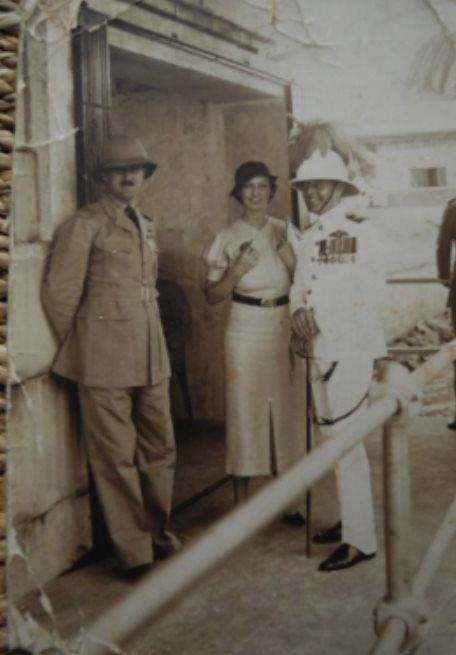
The Burton Observer and Chronicle – Thursday 19 September 1940:
BURTONIANS’ FRIENDSHIP WITH EX-ARAB LEADER. By Clare Sydney Smith (Cassell, 12s. 6d.). general interest as an intimate study of the most romantic personality on the Allied side… this volume has distinctly local appeal, for the authoress, who is a niece of the late Earl Haig, is the wife of Mr Commodore Sydney Smith, eldest son of Mr. Charles Smith (former joint managing director of Allsopp’s). Her volume, on the whole, is a fascinating record of the devoted friendship which existed between Colonel Lawrence of Arabia, her husband and herself during the latter years of the one-time Arab leader’s life. Their acquaintance with Lawrence, alias Aircraftman T. E. Shaw, commenced with the Cairo Conference in 1920.
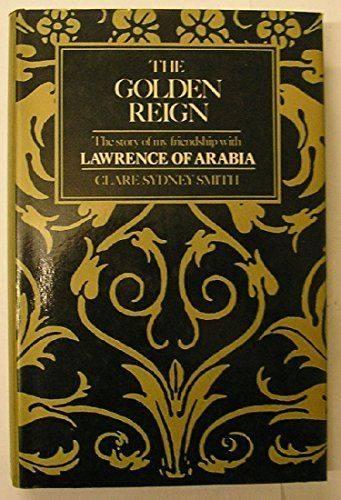
A photograph from the book: From left to right: Lord Astor, Wing-Commander Sydney Smith, Lady Astor, George Bernard Shaw, Charlotte Shaw (hiding behind GBS’s shoulder), Sydney’s daughter Maureen Sydney Smith, an unknown man, Clare Sydney Smith, and on the ladder, T.E.’s feet.
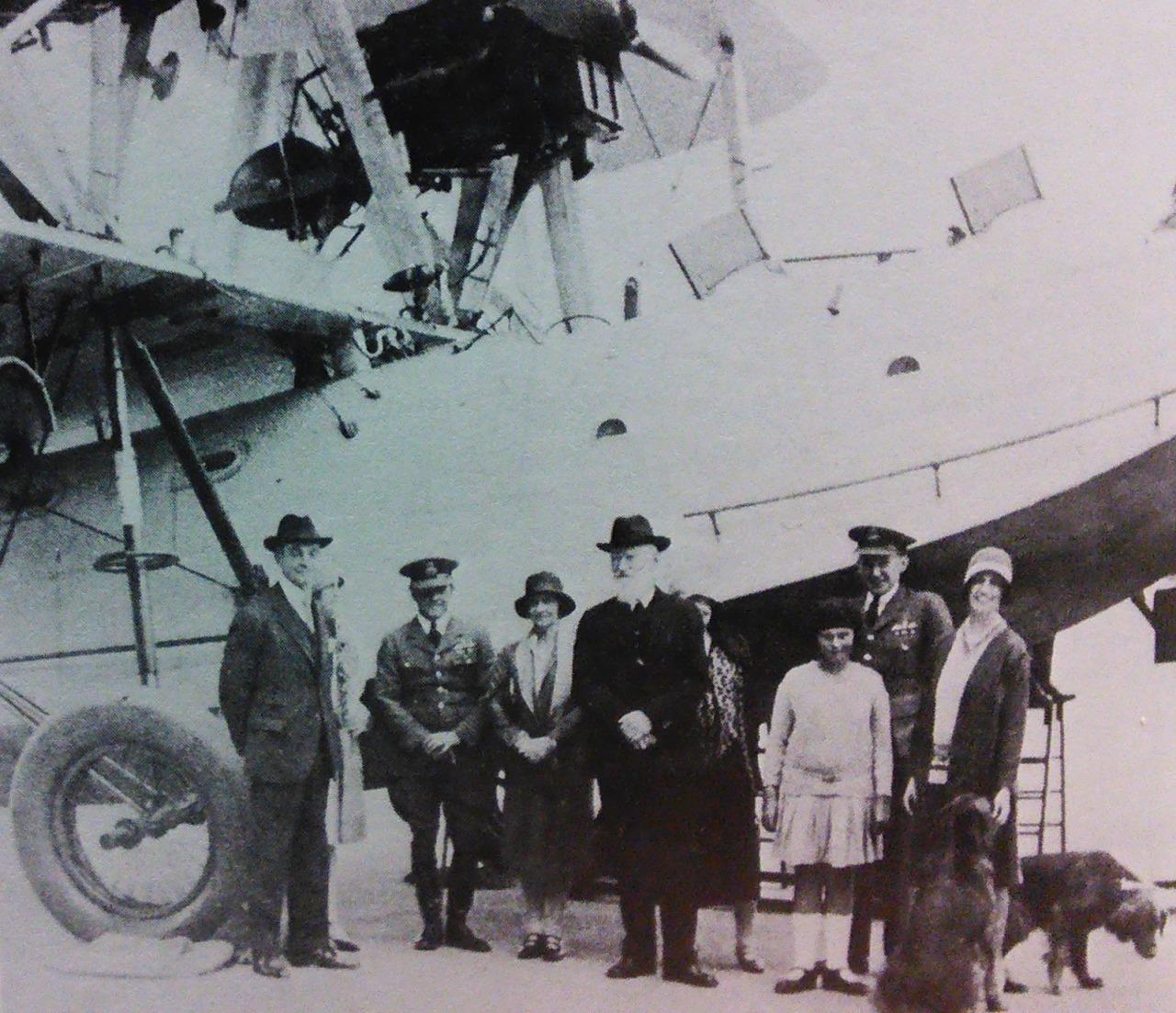
Also from Clare’s book:
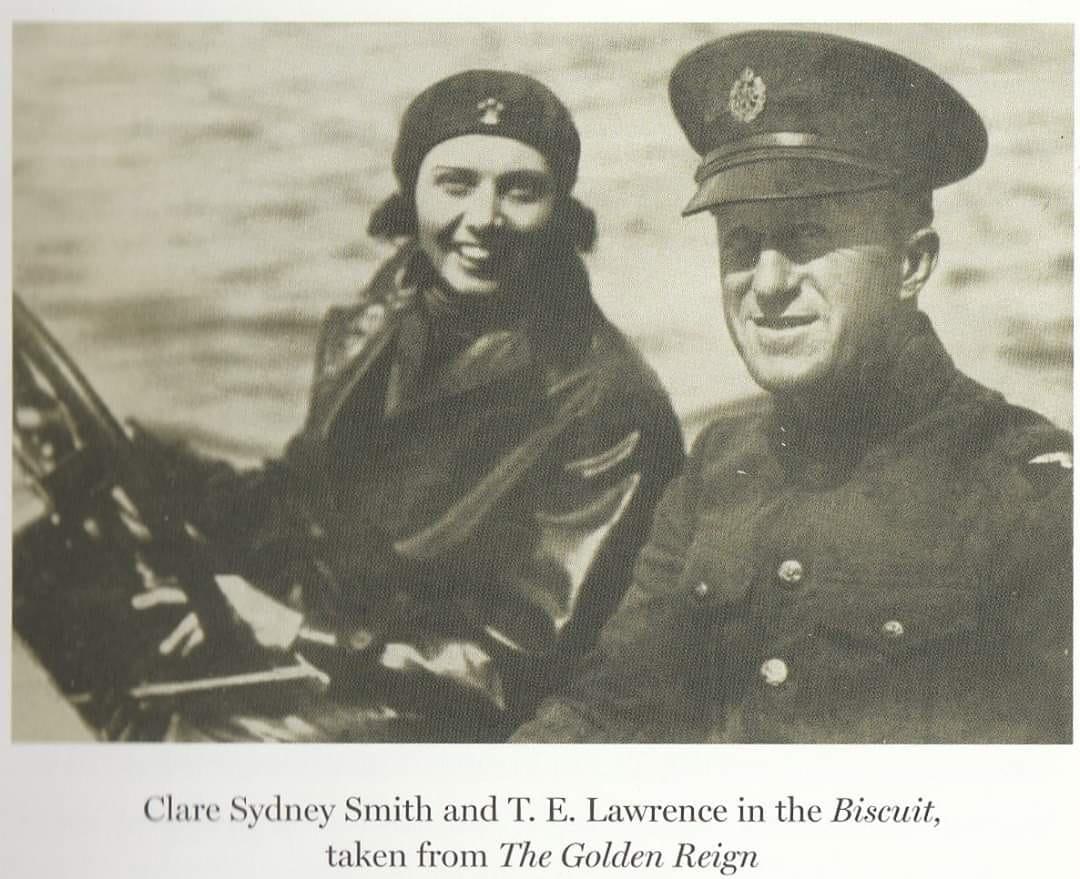
Sydney Smith with Lawrence of Arabia:
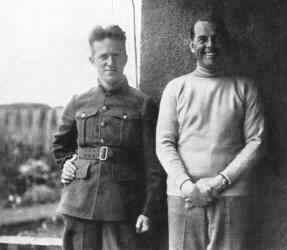 September 6, 2019 at 1:50 pm #4794
September 6, 2019 at 1:50 pm #4794In reply to: Pop﹡in People Tribulations
The man in the tux with the waxed mustache suddenly popped out from the plane, and back to his headquarters.
September 6, 2019 at 1:50 pm #4793In reply to: Cakletown and the Lone Chancers of Custard
“Bea!” Mari Fe called, “activate thread portal for a switch of realities please.”
[>>>>] The man in the tux with the waxed mustache suddenly popped out from the plane, and back to his headquarters.
His reconnaissance of the asset went fairly well, even if he feared he had her spooked a little. The poor thing seemed a bit soft on the inside despite her semblance of swagger.
Ed Steam’s armoured bears were fast asleep at the entrance, when he reappeared at the center of operations. The full team was almost reassembled: Aqua Luna had been the easiest to convince, though not the easiest to find, followed by Mari Fe, Cornella, Madame Li, Kiki Razwa, Björk, Skye, Jeremy the map dancer and some others recovered from limbo threads of realities.
Cackletown, despite the crowing noise of Maurice the cackling rooster, was a safe interspace reality to hide his base of operations.
August 2, 2019 at 8:17 am #4747In reply to: The Stories So Near
WHERE ARE THEY ALL NOW ? 🗻
a.k.a. the map thread, and because everything happens now anyway.
POP-IN THREAD (Maeve, Lucinda, Shawn-Paul, Jerk, [Granola])
🌀 [map link] – KELOWNA, B.C., CANADA
It looks like our group of friends live in Canada, Kelowna.
 Kelowna is a city on Okanagan Lake in the Okanagan Valley in the southern interior of British Columbia, Canada. The name Kelowna derives from an Okanagan language term for “grizzly bear”. The city’s motto: “Fruitful in Unity”
Kelowna is a city on Okanagan Lake in the Okanagan Valley in the southern interior of British Columbia, Canada. The name Kelowna derives from an Okanagan language term for “grizzly bear”. The city’s motto: “Fruitful in Unity”Interestingly, Leörmn the dragon from the Doline may have visited from time to time : Ogopogo / Oggie / Naitaka
FLYING FISH INN THREAD (Mater/Finly, Idle/Coriander/Clove, Devan, Prune, [Tiku])
Though very off the beaten track, the Flying Fish Inn may be located near a location that was a clue left as a prank by Corrie & Clove on the social media to lure conspiracy theorists to the Inn.
🔑 ///digger.unusually.playfullyIt seems to link to a place near documented old abandoned mines.
🌀 [map link] – SOME PLACE IN THE MIDDLE OF AUSTRALIA, OFF ARLTUNGA ROAD
- Tiku, the local bush lady is living around the place.
- The local shaman who rented the Jeep to Arona & her friends was nearby Uluru ‘s closest airport (Ayer’s Rock, Yulara). 🌀 [map link] : AYER’S ROCK, ULURU
DOLINE THREAD (Arona, Sanso/Lottie, Ugo, Albie)
This one is a tricky geographical conundrum, since the Doline is a multi-dimensional hub. It connects multiple realities and places though bodies of water, with the cave structure (the Doline) at its center, a world on its own right, where talking animals and unusual creatures are not uncommon.
It has shown to connect places in the Bayou in Louisiana, where Albie & Mandrake went to see the witch, as well as the coastal area of Australia, where they emerged next in their search for Arona.
At the center of the Doline is a mysterious dragon named Leörmn, purveyor of precious traveling pearls and impossible riddles. We thus may infer possible intersection points in our dimension, such as 🔑 ///mysterious.dragon.riddle a little North of Hawaii, in the middle of the Pacific Ocean.
However, the inside of the Doline would look rather like Phong Nha-Ke Bang gigantic cave in Vietnam.
NEWSREEL THREAD (Ms Bossy, Hilda/Connie, Sophie, Ricardo)
It is not very clear where our favourite investigative team is located. They are likely to be near an urban area with a well-connected international airport, given their propensity for impromptu traveling, such as in Iceland and Australia.
For all we know, they could be settled in Germany: 🔑 ///newspapers.gone.crazy
or Denmark 🔑 ///publish.odds.newsAs for the Doctor, we strongly suspect his current hideout to be also revealed when searching from his signature beautification prescription that has made him famous in connoisseur circles: 🔑 ///beauty.treatment.shot at the frontier of Sweden and Finland.
LIZ THREAD (Finnley, Liz, Roberto, Godfrey)
We don’t really know where the story happens; for that, one would need to dive into Liz’s turbulent past, and that would confound the most sane individual, starting with keeping count of her past husbands.
As a self-made powerful best-selling writer, we could guess she would take herself to be the JK Rowling of the Unplotted Booker Prize, and thus would be a well-traveled British uptart, sorry upstart, with a fondness for mansions with character and gardeners with toned glutes. Of course, one would need the staff.
DRAGON 💚 WOOD THREAD (Glynnis, Eleri, Fox/Gorrash, Rukshan)
This story happens in another completely different dimension, but it can be interesting to explore some of its unusual geography.
The World revolved around a central axis, and different worlds stacked one upon the other, with the central axis like an elevator.
We know of
- the World of Humans, where most of the story takes place
- the world of Gods, above it, which has been sealed off, and where most Gods disappeared in the old ages
- Under these two, the world of Giants exists, still to be explored.
At the intersection of the central axis of the world and the human world, radiates the Heartwood, a mystical forest powered by the Gem of Creation which has been here since the Dawn of Times, and is a intricate maze, and a dimension in itself. It had grown around itself different woods and glades and forests, with various level of magical properties meant to repel intruders or lesser than Godlike beings.
The Fae dimension is a particular dimension which exists parallel to the Human World, accessible only to Elder Faes, and where the race originated, and is now mostly deserted, as Faes’ magic waning with the encroachment of humans into the Forest, most have chosen to live in the Forests and try and protect them.
February 15, 2016 at 5:29 pm #3931In reply to: Cakletown and the Lone Chancers of Custard
Prune turned to look back at Quentin as she made her way home. He’d have been better off waiting for a new chapter in the refugee story, instead of blundering into that limbo with that daft smile on his face. What a silly monkey, she thought, scratching under her arms and making chimpanzee noises at the retreating figure. Look at him, scampering along gazing up into the treetops, instead of watching his step.
A deep barking laugh behind her made her freeze, with her arms akimbo like teapot handles. Slowly she turned around, wondering why she hadn’t noticed anyone else on the track a moment before.
“Who are you?” she asked bluntly. “I’m Prune, and he’s Quentin,” she pointed to the disappearing man, “And he’s on the run. There’s a reward for his capture, but I can’t catch him on my own.” Prune almost cackled and hid the smirk behind her forearm, pretending to wipe her nose on it. She wondered where the lies came from, sometimes. It wasn’t like she planned them ~ well, sometimes she did ~ but often they just came tumbling out. It wasn’t a complete lie, anyway: there was no reward, but he could be detained for deserting his new story, if anyone cared to report it.
The man previously known as the Baron introduced himself as Mike O’Drooly. “I’m a story refugee,” he admitted.
“Bloody hell, not another one,” replied Prune. Then she had an idea. “If you help me capture Quentin, you’ll get a much better character in the new story.”
“I’ve nothing left to lose, child. And no idea what my story will be or what role I will play.” Perhaps it’s already started, he wondered.
“Come on, then! If we don’t catch him quick we might all end up without a story.”
February 27, 2013 at 4:22 am #3001In reply to: The Surge Team’s Coils
Ed Steam’s brilliant plan was simple enough. He had dreamt about it a while ago and the idea had grown on him ever since. Now, he had all he needed to make it happen. The land, the materials, and the artefacts and rotes needed to manipulate the bulk of it around.
It was simple, actually and yet every detail had to be perfect. There were matters of perspective and proportions that were delicate to manage.
And of course he had to be careful using the artefacts with finesse, to be undetected by the Surge team’s monitoring systems. He had designed most of them, so he wasn’t too concerned, although Cornella’s upgrades may be more efficient.
He had calculated the project would probably take him years to complete, but he was fine with it, it was a fun adventure, creating your own palace so to speak.First, the grounds. That of a glorious castle, with French gardens on a large lightly sloped tumulus. His armoured bears could stay in the surrounding forest where beehives were strategically placed.
On top of the tumulus, instead of a castle, there was a large mill, a cross between a windmill, castle and lighthouse maybe, with walls white and round, many entrances, rooms and stairs leading to the upper levels. That was where most of the work was to be organized. The whole roof was actually like a city, with narrow streets even.
Except the buildings where made from entire stacks of full-sized caravans, making living units, each with its own interior and decoration.He didn’t know why the stacks of caravans were so appealing to him. Frankly, said like this it could seem like a hill of rubbish dump. However, he had visited this dream place when it was full of people, a fellowship of people living in the caravans and enjoying this particular place. He’d figured, this seems so great and I have the means to create it, so if not me, who else?
January 25, 2013 at 3:04 pm #2988In reply to: Get your Surge Team straight
Ed Steam’s Rally Update:
Where is your Surge Team now?
- 1. Cornella • last seen in Long Poon, with computer troubles (#2942)
- 2. Pearl • last seen with Mari Fe considering freezing their butts on a flying carpet in a shop at Baku (#2939)
- 3. Mari Fe • last seen with Pearl (#2939)
- 4. Skye • last seen missing in action, probably lost in London’s last surge of fog (#2851)
- 5. Katarina • last seen with Pearl and Mari Fe (#2939)
- 6. Vera Pappaloosa • last seen with Lulla set to meet in Pohnpei, in the middle of the Pacific to deal with a yet undefined surge (#2863)
- 7. Kiki Razwa • last seen chatting with Björk about an upcoming transportation surge (#2941)
- 8. Björk • last seen on her way to deal with a transportation surge somewhere in Europe (#2941)
- 9. Janet Mendyourhall • last seen heading her way back to Nevada after containing a zombilic surge in Spain (#2922)
- 10. Lulla Spinosa • last seen meeting with Vera (#2863)
- 11. Madam Li • last seen heading back to Harbin, in Shanghai’s metro, after a snow surge successfully contained (#2940)
- 12. Anita Charmpatti • in Mumbai (no comment yet)
- 13. Elza • last seen in Moscow managing a taser surge (#2937)
Other recurring characters in the same timeline:
- Ed Steam • last seen fomenting a sinister plot in his secret hideout after faking his own demise and looting the Surge HQ artefacts warehouse (#2946)
- Aqua Luna • last seen at an unknown location, in a mysterious ship after a probable alien abduction in Long Poon (#2945)
- Belle (Bee) Endwhistle • last seen flushed out-of-body in the magic E-map, but didn’t yet reappear unlike Pearl and Mari Fe (#2902)
Recurring other-dimensional characters in the same timeline:
- Arona • last seen with Sanso, god Vincentius, the cat Mandrake and ugly big adult-grown-baby Yikesy looking in the sabulmantium, in a quest to find a Chinese dragon (#2916)
Other characters in the future timeline:
- Captain YangLang • last seen at the management of the old Long Poon Surge abandoned facility, recovering Ed Steam’s lost time capsule #23 (#2864)
October 16, 2008 at 2:34 pm #1440In reply to: Join me for a gourd of langoat milk……
August 26, 2008 at 12:46 pm #2153In reply to: The Story So Far
The Crystal Skulls So Far…

The crystal skulls first appeared in the Far West saga, where it’s hinted that around the 1850s, some crystal skulls are found/smuggled by Aldous McGaughran. Their origin is not told.
It seems that (at least) one of his crystal skulls are passed down to Claudio in Spain through his grand-father’s acquaintance of Cillian Mc Gaughran (one of Wrick’s ancestors) — ref.
That skull is auctioned and a lady in salmon (the fake viscountess who is in reality an agent of the Mad Baron) gets it. This skull finishes its trip in the Baron’s lair (at around our time ~2007)… The Baron’s mansion will become (in the 2030s?) the home of the twins, and Wrick family.Some of the crystal skulls are also found in the past (1950s?) around the mysterious figure of Mrs Chesterhope who is already hunting for them in (Brunei?) sultanate, using Georges to do so.
Later (around 2008) she locates one on the island of Tikfijikoo, and she sends a gang of magpies to find them, but their efforts are thwarted and she needs to get there in person (and motorcycle).The Confregation is an organization which seems to know some things about them and are the origin of the one lent to the Dr Bronkelhampton on Tikfijikoo (retrieved from Crusaders a long time ago).
Beattie and Leonora Fletcher, a couple of batty Brit ladies seems to have found some of them too , and have a network of their own…
Later (2030s?), near the Indian Ocean, one is found by Gayesh’s family too …
June 13, 2008 at 12:04 pm #932In reply to: Circle of Eights, Stories
Madame Chesterhope couldn’t believe her ears.
— WHAT?! YOU LOST IT?!
— Yes Madam, we lost contact, and we have reasons to believe that an unexpected well-planned counter attack on our team of magpies is to be blamed for…
— For that fiasco, Tfark! And where is the damn skull?! Will I have to go fetch it myself?
— There was report of a spy mottherfly that managed to escape by the wortex before it was closed. Nothing definite but we have reason to believe that the skull is still on the island. An agent of your old friend the Baron has been spotted heading back there.
— I will deal with it myself then.The glow of the transmission ball went out in a whiff.
Ah, she hated to have to come back to that dimension, especially in this time framework where everything was so clouded in terms of potentials. But she couldn’t really trust anyone on that.
-
AuthorSearch Results
Search Results for '946'
Viewing 13 results - 1 through 13 (of 13 total)
-
Search Results
Viewing 13 results - 1 through 13 (of 13 total)